人教版(2019)选择性必修第一册Unit 5 Working the Land Learning about Language 语法 课件(共19页)
文档属性
| 名称 | 人教版(2019)选择性必修第一册Unit 5 Working the Land Learning about Language 语法 课件(共19页) | 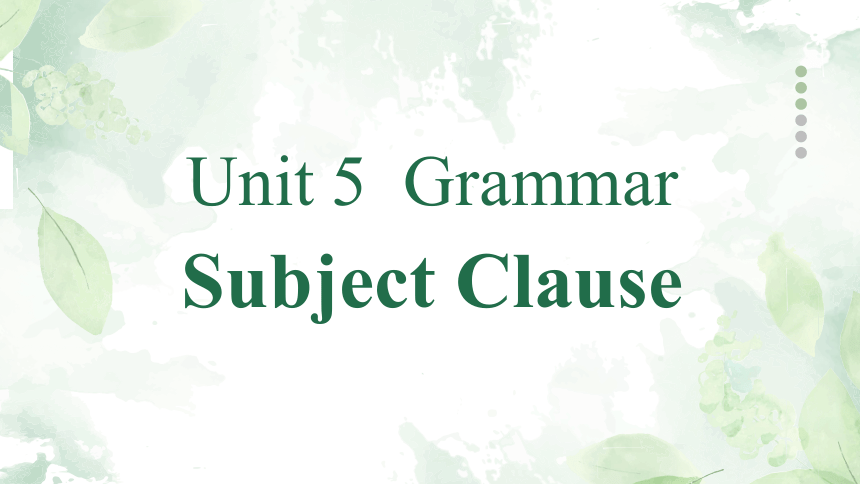 | |
| 格式 | pptx | ||
| 文件大小 | 2.0MB | ||
| 资源类型 | 教案 | ||
| 版本资源 | 人教版(2019) | ||
| 科目 | 英语 | ||
| 更新时间 | 2024-10-03 21:25:17 | ||
图片预览

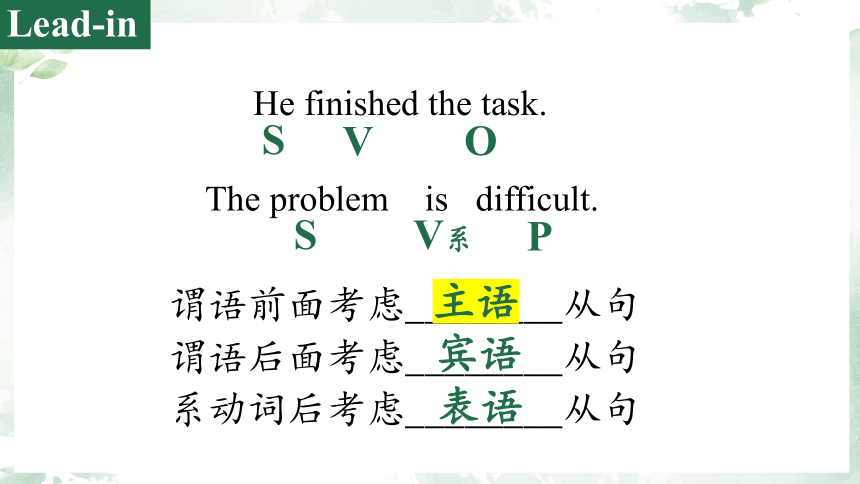
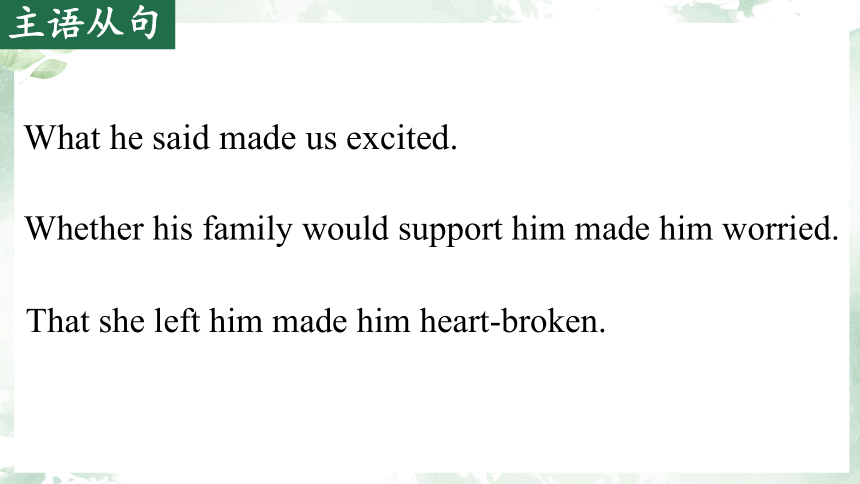
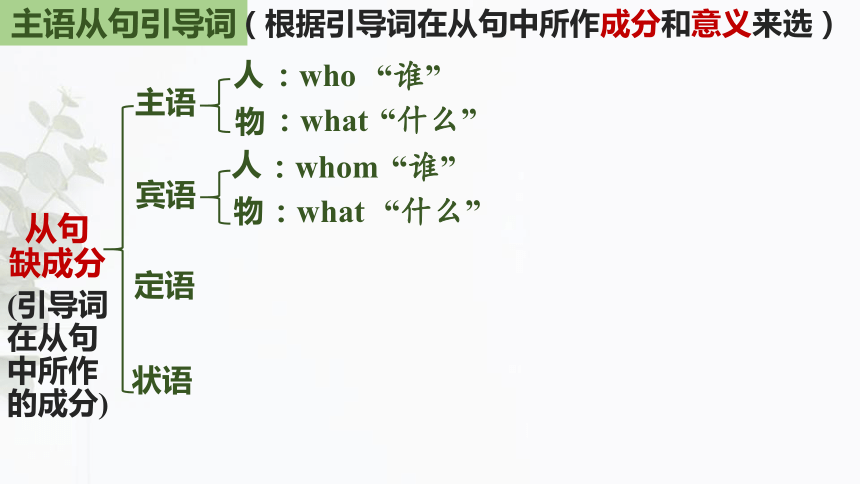
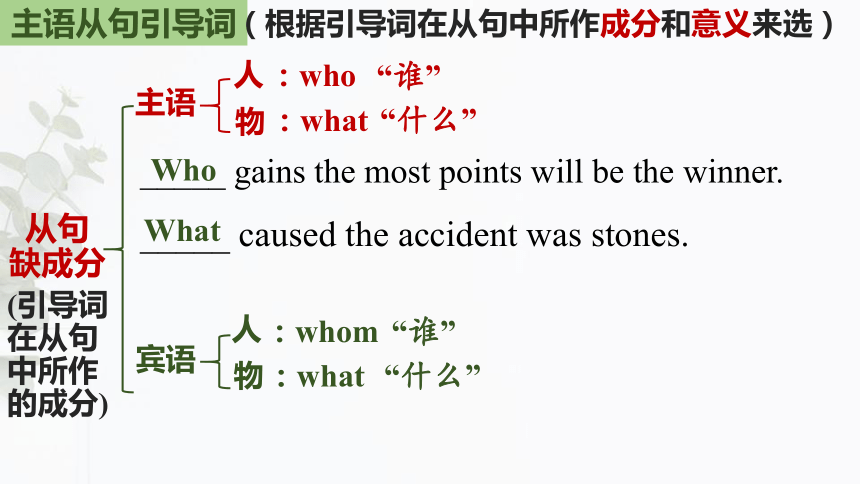
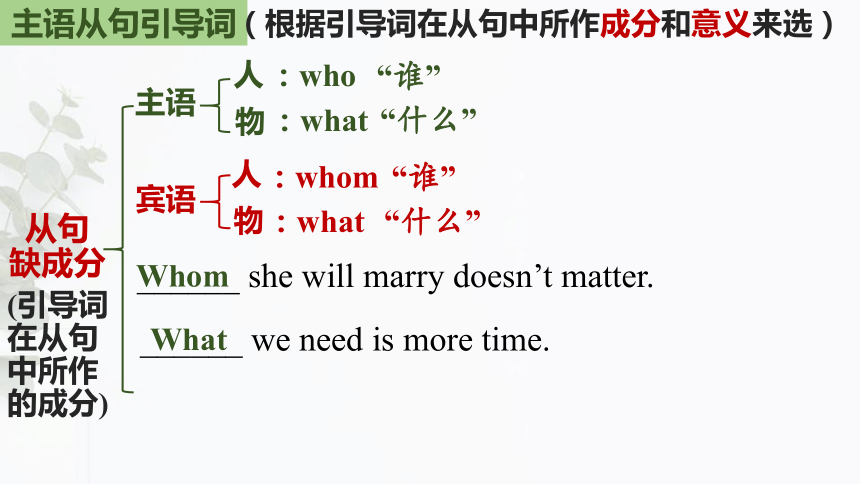
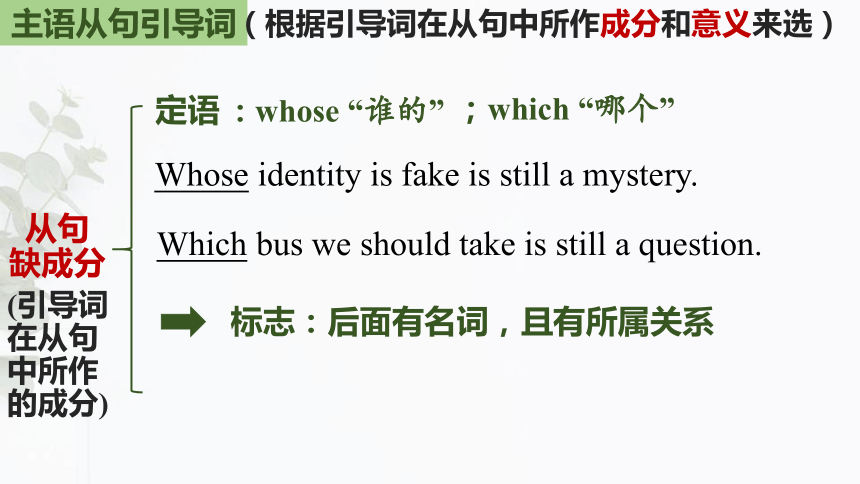
文档简介
(共19张PPT)
Unit 5 Grammar
Subject Clause
get dressed 穿好衣服(强调动作)
Lead-in
谓语前面考虑________从句
谓语后面考虑________从句
系动词后考虑________从句
The problem is difficult.
He finished the task.
S
V
O
S
V系
P
主语
宾语
表语
get dressed 穿好衣服(强调动作)
主语从句
What he said made us excited.
Whether his family would support him made him worried.
That she left him made him heart-broken.
主语从句引导词
从句
缺成分
主语
定语
人
:who
物
:what
宾语
人
:whom
物
:what
状语
(引导词在从句中所作的成分)
“谁”
“什么”
“谁”
“什么”
(根据引导词在从句中所作成分和意义来选)
主语从句引导词
从句
缺成分
主语
人
:who
物
:what
宾语
人
:whom
物
:what
(引导词在从句中所作的成分)
“谁”
“什么”
“谁”
“什么”
(根据引导词在从句中所作成分和意义来选)
_____ caused the accident was stones.
_____ gains the most points will be the winner.
Who
What
主语从句引导词
从句
缺成分
主语
人
:who
物
:what
宾语
人
:whom
物
:what
(引导词在从句中所作的成分)
“谁”
“什么”
“谁”
“什么”
(根据引导词在从句中所作成分和意义来选)
______ we need is more time.
______ she will marry doesn’t matter.
Whom
What
主语从句引导词
从句
缺成分
(引导词在从句中所作的成分)
(根据引导词在从句中所作成分和意义来选)
定语
:whose “谁的”
;which “哪个”
Whose identity is fake is still a mystery.
Which bus we should take is still a question.
标志:后面有名词,且有所属关系
主语从句引导词
从句
缺成分
主语
定语
人
:who
物
:what
宾语
人
:whom
物
:what
状语
when (时间)
:whose “谁的”
;which “哪个”
where (地点)
why (原因)
how (方式)
(引导词在从句中所作的成分)
“什么时候”
“在哪/去哪”
“为什么”
“怎么/怎样”
“谁”
“什么”
“谁”
“什么”
(根据引导词在从句中所作成分和意义来选)
主语从句引导词
从句
缺成分
状语
when (时间)
where (地点)
why (原因)
how (方式)
(引导词在从句中所作的成分)
“什么时候”
“在哪/去哪”
“为什么”
“怎么/怎样”
(根据引导词在从句中所作成分和意义来选)
______ the bomb will explode worries the man.
______ we go on holiday depends on the available money we have.
_____ he didn't take part in the activity was unknown.
_____ we can boost the yield remains a question.
When
Where
Why
How
主语从句引导词
从句
缺成分
主语
定语
人
:who
物
:what
宾语
人
:whom
物
:what
状语
when (时间)
:whose “谁的”
;which “哪个”
where (地点)
why (原因)
how (方式)
(引导词在从句中所作的成分)
“什么时候”
“在哪/去哪”
“为什么”
“怎么/怎样”
“谁”
“什么”
“谁”
“什么”
(根据引导词在从句中所作成分和意义来选)
主语从句引导词
从句
不缺成分
(根据引导词在从句中所作成分和意义来选)
that (不作成分,且无意义)
whether (不作成分,但有“是否”的意义)
That the earth is round is a fact.
Whether Tom really saw Amy was doubtful.
主语从句引导词
从句
缺成分
主语
定语
人
:who
物
:what
宾语
人
:whom
物
:what
状语
when (时间)
:whose “谁的”
;which “哪个”
where (地点)
why (原因)
how (方式)
(引导词在从句中所作的成分)
从句
不缺成分
“什么时候”
“在哪/去哪”
“为什么”
“怎么/怎样”
“谁”
“什么”
“谁”
“什么”
①that
(不作成分
且无意义)
②whether
(不作成分
但有“是否”的意义)
(根据引导词在从句中所作成分和意义来选)
get dressed 穿好衣服(强调动作)
Practice
______ she said is true.
______ the earth moves around the sun is well known.
______ she is from is unknown.
______ will give us a speech is still uncertain.
______ coat is red is a difficult question to her, because she has red-green color blindness.
What
Who
That
Where
Whose
get dressed 穿好衣服(强调动作)
主语从句的语序
When will he come is not known.
When he will come is not known.
√
×
主语从句一律用陈述语序,即从句中主语在前,谓语在后。
When they will start and where they will go _____(be)still unknown.
主语从句的主谓一致
单个主语从句作主句主语,主句谓语动词用______;两个或两个以上的主语从句作主语,主句谓语动词用______。
How she keeps healthy _____(be) a secret.
When they will start and where they will go _____(be)still unknown.
is
are
单数
复数
When they will start and where they will go _____(be)still unknown.
形式主语it
主语从句一般放在句首,但有时为了保持句子结构平衡, 避免“头重脚轻”,常用it 作形式主语,而把从句放在后面。
1. That the earth moves around the sun is well known.
It is well known that the earth moves around the sun.
2. That she has made such a mistake is a pity .
It is a pity that she has made such a mistake.
When they will start and where they will go _____(be)still unknown.
形式主语it代替主语从句的句式
It be + adj. + 从句
It is certain that… 肯定…
It is possible that... 可能……
It is unlikely that... 不可能……
It is obvious that… 很明显…
It is necessary / important / clear / strange / surprising / interesting / essential that
E.g. It is obvious that this measure is effective.
When they will start and where they will go _____(be)still unknown.
形式主语it代替主语从句的句式
It be + n. + 从句
It is a pity / fact / common knowledge ... that
E.g. It is a pity that we lost the match.
When they will start and where they will go _____(be)still unknown.
形式主语it代替主语从句的句式
It be + done(过去分词) + 从句
It is said that... 据说……
It is well known that ... 众所周知……
It is reported / announced that... 据报道……
It is estimated that... 据估计……
It is believed / thought / considered that... 人们相信……
It is suggested that ... 人们建议……
It must be admitted… 必须承认……
It cannot be denied… 不可否认……
Unit 5 Grammar
Subject Clause
get dressed 穿好衣服(强调动作)
Lead-in
谓语前面考虑________从句
谓语后面考虑________从句
系动词后考虑________从句
The problem is difficult.
He finished the task.
S
V
O
S
V系
P
主语
宾语
表语
get dressed 穿好衣服(强调动作)
主语从句
What he said made us excited.
Whether his family would support him made him worried.
That she left him made him heart-broken.
主语从句引导词
从句
缺成分
主语
定语
人
:who
物
:what
宾语
人
:whom
物
:what
状语
(引导词在从句中所作的成分)
“谁”
“什么”
“谁”
“什么”
(根据引导词在从句中所作成分和意义来选)
主语从句引导词
从句
缺成分
主语
人
:who
物
:what
宾语
人
:whom
物
:what
(引导词在从句中所作的成分)
“谁”
“什么”
“谁”
“什么”
(根据引导词在从句中所作成分和意义来选)
_____ caused the accident was stones.
_____ gains the most points will be the winner.
Who
What
主语从句引导词
从句
缺成分
主语
人
:who
物
:what
宾语
人
:whom
物
:what
(引导词在从句中所作的成分)
“谁”
“什么”
“谁”
“什么”
(根据引导词在从句中所作成分和意义来选)
______ we need is more time.
______ she will marry doesn’t matter.
Whom
What
主语从句引导词
从句
缺成分
(引导词在从句中所作的成分)
(根据引导词在从句中所作成分和意义来选)
定语
:whose “谁的”
;which “哪个”
Whose identity is fake is still a mystery.
Which bus we should take is still a question.
标志:后面有名词,且有所属关系
主语从句引导词
从句
缺成分
主语
定语
人
:who
物
:what
宾语
人
:whom
物
:what
状语
when (时间)
:whose “谁的”
;which “哪个”
where (地点)
why (原因)
how (方式)
(引导词在从句中所作的成分)
“什么时候”
“在哪/去哪”
“为什么”
“怎么/怎样”
“谁”
“什么”
“谁”
“什么”
(根据引导词在从句中所作成分和意义来选)
主语从句引导词
从句
缺成分
状语
when (时间)
where (地点)
why (原因)
how (方式)
(引导词在从句中所作的成分)
“什么时候”
“在哪/去哪”
“为什么”
“怎么/怎样”
(根据引导词在从句中所作成分和意义来选)
______ the bomb will explode worries the man.
______ we go on holiday depends on the available money we have.
_____ he didn't take part in the activity was unknown.
_____ we can boost the yield remains a question.
When
Where
Why
How
主语从句引导词
从句
缺成分
主语
定语
人
:who
物
:what
宾语
人
:whom
物
:what
状语
when (时间)
:whose “谁的”
;which “哪个”
where (地点)
why (原因)
how (方式)
(引导词在从句中所作的成分)
“什么时候”
“在哪/去哪”
“为什么”
“怎么/怎样”
“谁”
“什么”
“谁”
“什么”
(根据引导词在从句中所作成分和意义来选)
主语从句引导词
从句
不缺成分
(根据引导词在从句中所作成分和意义来选)
that (不作成分,且无意义)
whether (不作成分,但有“是否”的意义)
That the earth is round is a fact.
Whether Tom really saw Amy was doubtful.
主语从句引导词
从句
缺成分
主语
定语
人
:who
物
:what
宾语
人
:whom
物
:what
状语
when (时间)
:whose “谁的”
;which “哪个”
where (地点)
why (原因)
how (方式)
(引导词在从句中所作的成分)
从句
不缺成分
“什么时候”
“在哪/去哪”
“为什么”
“怎么/怎样”
“谁”
“什么”
“谁”
“什么”
①that
(不作成分
且无意义)
②whether
(不作成分
但有“是否”的意义)
(根据引导词在从句中所作成分和意义来选)
get dressed 穿好衣服(强调动作)
Practice
______ she said is true.
______ the earth moves around the sun is well known.
______ she is from is unknown.
______ will give us a speech is still uncertain.
______ coat is red is a difficult question to her, because she has red-green color blindness.
What
Who
That
Where
Whose
get dressed 穿好衣服(强调动作)
主语从句的语序
When will he come is not known.
When he will come is not known.
√
×
主语从句一律用陈述语序,即从句中主语在前,谓语在后。
When they will start and where they will go _____(be)still unknown.
主语从句的主谓一致
单个主语从句作主句主语,主句谓语动词用______;两个或两个以上的主语从句作主语,主句谓语动词用______。
How she keeps healthy _____(be) a secret.
When they will start and where they will go _____(be)still unknown.
is
are
单数
复数
When they will start and where they will go _____(be)still unknown.
形式主语it
主语从句一般放在句首,但有时为了保持句子结构平衡, 避免“头重脚轻”,常用it 作形式主语,而把从句放在后面。
1. That the earth moves around the sun is well known.
It is well known that the earth moves around the sun.
2. That she has made such a mistake is a pity .
It is a pity that she has made such a mistake.
When they will start and where they will go _____(be)still unknown.
形式主语it代替主语从句的句式
It be + adj. + 从句
It is certain that… 肯定…
It is possible that... 可能……
It is unlikely that... 不可能……
It is obvious that… 很明显…
It is necessary / important / clear / strange / surprising / interesting / essential that
E.g. It is obvious that this measure is effective.
When they will start and where they will go _____(be)still unknown.
形式主语it代替主语从句的句式
It be + n. + 从句
It is a pity / fact / common knowledge ... that
E.g. It is a pity that we lost the match.
When they will start and where they will go _____(be)still unknown.
形式主语it代替主语从句的句式
It be + done(过去分词) + 从句
It is said that... 据说……
It is well known that ... 众所周知……
It is reported / announced that... 据报道……
It is estimated that... 据估计……
It is believed / thought / considered that... 人们相信……
It is suggested that ... 人们建议……
It must be admitted… 必须承认……
It cannot be denied… 不可否认……
